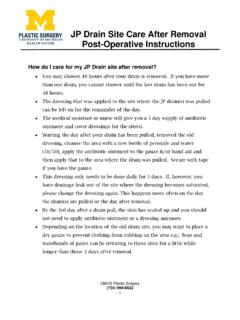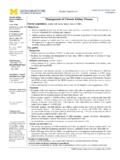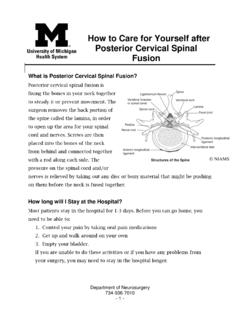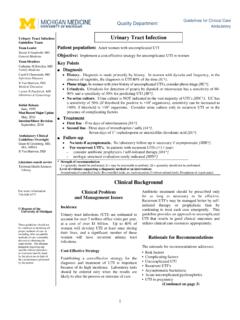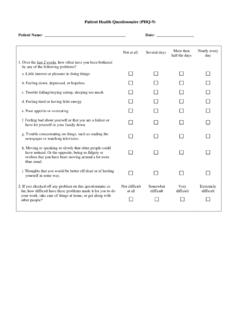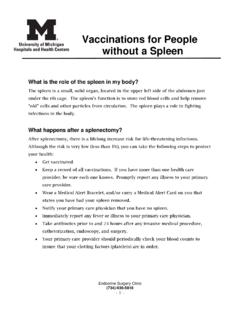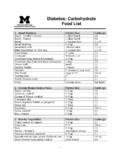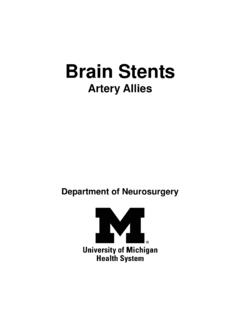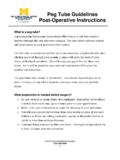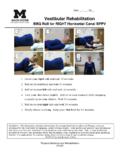Transcription of Sample Letter of Mental Health support for Gender ...
1 Most Health insurance companies currently require patients to have two letters of support from Mental Health providers before the insurance will authorize insurance coverage for Gender -affirming hysterectomy surgeries. The following information is intended to provide Mental Health providers with guidance regarding the content insurance companies typically expect in such letters. Michigan Medicine does not endorse or imply that any particular pathway to Gender affirmation applies to all or even most people who experience Gender dysphoria. Further, Michigan Medicine does not promise that use of this Letter template will result in surgical authorizations or access and can assume no liability for any Letter written based on this template for any patient seeking Gender affirming medical care.
2 Mental Health professionals using this template do so at their own risk. The World Professional Association for transgender Health (WPATH) recommends the following format for letters: 1. Client's general identifying characteristics; and 2. Results of the client's psychosocial assessment , including any diagnoses; and 3. The duration of the Mental Health professional's relationship with the client, including the type of evaluation and therapy or counseling to date; and 4. An explanation that the WPATH criteria for surgery have been met, and a brief description of the clinical rationale for supporting the patient's request for surgery; and 5. A statement about the fact that informed consent has been obtained from the patient; and 6.
3 A statement that the Mental Health professional is available for coordination of care and welcomes a phone call to establish this. Sample Letter of Mental Health support for Gender -Affirming Hysterectomy ~ON LETTERHEARD~ [DATE] Re: [patient name on insurance card], [patient's chosen/used/prefered name], [patient DOB] To Whom it May Concern, I am writing this Letter on behalf of PATIENT (DOB: MM/DD/YYYY). The following Letter is in support of PATIENT s request for hysterectomy due to Gender dysphoria. I am a [therapist/ Mental Health professional, etc. at CLINIC OR SETTING] and have assessed the psychosocial readiness and eligibility of PATIENT who is seeking Gender -affirming hysterectomy surgery.
4 I am experienced in caring for people with Gender dysphoria, and am aware of the WPATH Standards of Care, version 7, guidelines for Gender -affirming surgery. I have worked with PATIENT since MM/DD/YYYY in [weekly/monthly/etc. therapy OR for a surgical evaluation over XX TIME I have worked with PATIENT in a consultative capacity for the purposes of writing this Letter ]. PATIENT was assigned female sex at birth, and identifies as [ Gender identity: a man, nonbinary, etc] and uses [he/him, she/her, they/them] pronouns. During this time, PATIENT has presented [her/himself/themself] consistently as having a [fe/male, nonbinary] identity. PATIENT first knew their Gender identity differed from their assigned sex at age [age].
5 They have socially transitioned by [list how changed name, pronouns, dress, make-up, hair, tuck, pack, binding, coming out, etc.). They have been successfully and consistently living in a Gender role congruent with their affirmed Gender since [date]. They have been consistently on hormone therapy since [date; If contraindicated or chosen not to take hormones, state that here]. Despite these interventions, they report significant anxiety, depression and distress due to their experience of Gender dysphoria. They have expressed a persistent desire for Gender -affirming hysterectomy. By my independent evaluation of PATIENT, I diagnosed them with Gender Dysphoria (ICD-10 ).]
6 The dysphoria that PATIENT currently experiences arises from the incongruence between [her/his/their] body and [her/his/their] Gender identity. This distress causes PATIENT to experience heightened anxiety [OR whatever the identifiable and documented distress is depression, suicidal ideation, etc.] and causes functional interference with [her/his/their] ability to engage in social and interpersonal relationships and activities in a manner that would be expected of any other person at [her/his/their] level of education and position [OR whatever describes the person's impairments in functioning level]. Rectifying [her/his/their] body incongruence is reasonably expected to provide marked relief for the anxiety and distress that PATIENT experiences, thereby allowing [her/him/them] to live a fully functional and meaningful life in society without further impairment.
7 PATIENT has no history of, nor does [s/he/they] present with, any medical or psychiatric co-morbidity that would preclude [her/him/them] from giving informed consent for Gender -affirming surgery. However, PATIENT needs this surgery to address their Gender dysphoria. PATIENT has the capacity and ability to understand the effects of surgery and aftercare. PATIENT was born on [DOB] and therefore meets the age of majority criteria for this surgery. I have explained the risks, benefits and alternatives of this surgery and believe they have an excellent understanding of them. PATIENT can make an informed decision with their surgeon about undertaking surgery. PATIENT has more than met the WPATH criteria for Gender -affirming hysterectomy.
8 I believe that the next appropriate step for them is to undergo Gender -affirming hysterectomy, and I believe this will help them make significant progress in further treating their Gender dysphoria. It is my clinical opinion that PATIENT meets criteria Gender dysphoria ( ), has met the requirements for the WPATH Standards of Care, version 7, and it is at this time medically necessary for PATIENT to undergo Gender -affirming hysterectomy surgery. I am available to answer questions or concerns about this Letter . I may be reached at [phone number]. If you have questions or concerns, please do not hesitate to contact me. Sincerely, [your name and credentials- required] [your phone number- required]
